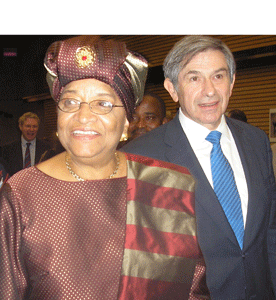
Liberia Must Pay 1.5 Billion Dollars To The IMF, World Bank, And African Development Fund
By Samuel P. Jackson
The
Perspective
Atlanta, Georgia
February 26, 2007
Recently the US, Germany and the United Kingdom announced that debts owed by Liberia to these countries would be waived under the context of the HIPC Initiative. The United States, Germany and the UK would waive around 700 million dollars owed them if Liberia agrees to significant economic and social reforms, and also write a Poverty Reduction Strategy Paper (PRSP) endorsed by all segments of Liberian society. That would still leave outstanding debts of nearly 3 billion dollars at a cost of 1,000 dollars to each Liberian to pay off the loans!
 |
|
President Sirleaf
& Mr. Paul Wolfowitz, President of World Bank |
Several international non-governmental organizations (NGO’s) and even some higher-ups in the UN are calling for 100 percent debt cancellation to poor nations, including Liberia. The argument often made is that the debts were incurred and misused by tyrants, and consequently citizens of heavily indebted poor nations should not be held liable for the outstanding amounts!
The IMF and the World Bank have forcefully resisted 100 percent debt cancellation for practical reasons. The institutions have shareholders just as any business and the assets are tied to gold reserves bought by the owners. 100 percent debt cancellation would decrease the ability of the institutions to make new loans to other needy countries, thus diminishing their capacities to finance development. They claim that for each dollar of debt cancelled, there would be a reduction of 5 dollar in their ability to make new loans.
There can be additional debt relief under the Multilateral Debt Relief Initiative (MRDI), but only after a successful completion of the HIPC Initiative, which takes on average 3 years for most countries and for some countries with diminished capacities, 5 to 6 years! In June 2005, the Group of 8 (G-8) major industrial countries proposed that three multilateral institutions—the IMF, the International Development Association (IDA) of the World Bank, and the AfDF—cancel 100 percent of their debt claims on countries that have reached, or will eventually reach, the completion point under the joint IMF-World Bank enhanced HIPC Initiative.
The HIPC Initiative entailed coordinated action by multilateral organizations and governments to reduce to sustainable levels the external debt burdens of the most heavily indebted poor countries. The MDRI goes further by providing full debt relief so as to free up additional resources to help these countries reach the Millennium Development Goals (MDGs). Unlike the HIPC Initiative, the MDRI does not propose any parallel debt relief on the part of official bilateral or private creditors, or of multilateral institutions beyond the IMF, International Development Association, (IDA) and the (AfDF).
Although the MDRI is common to three institutions, conditions for debt relief vary. Each institution has internal guidelines on participation into MDRI. However, the rules for participation into the MDRI are also governed by uniformity. All countries with per-capita income of US$380 a year or less (whether HIPCs or not) will receive MDRI debt relief financed by the IMF's own resources through MDRI-I Trust. HIPCs with per capita income above that threshold will receive MDRI relief from bilateral contributions administered by the IMF through the MDRI-II Trust.
The need to settle Liberia’s debts is urgent. Even World Bank President Paul Wolfowitz has acknowledged that fact. He recently said "the $3.7- billion debt is an unacceptable burden for a country of only three million people. If Liberians fail to see improvements in their lives, the forces of violence could engulf their country once again, Liberia could slide back into chaos that threatens not only its own people but its neighbors, and an historic opportunity would have been lost.”
“Now is the time for multilateral institutions
to step up to the plate and commit to assisting one
of the world’s poorest countries rid itself of
the stranglehold of poverty,” said UN official,
Anwarul K. Chowdury, High Representative for the Least
Developed Countries, Landlocked Developing Countries
and Small Island Developing States, in a statement.
Further the UN Envoy said, “Undoubtedly, Liberia
deserves special consideration given her recent tumultuous
history and current post-conflict reconstruction efforts.
The efforts of the Government and the people of Liberia
would really benefit from a decision to immediately
forgive its outstanding multilateral debt.”
There is no certainty that the multilateral institutions
will heed the pleas. We need to face the hard fact that
all of Liberia’s debts might not be cancelled,
and despite the international goodwill of the present
administration, the road to debt waiver is an uphill
slippery slope and denial will do us no good!
Thus the need to develop a “new engagement model” with the multilateral institutions has become urgent. The issue of the country’s debts must be resolved quickly. HIPC and MDRI are not panaceas. In fact, Liberia’s debt problems are unique and should not be settled under existing arrangements. Twenty-five years of coups and wars have reduced the capacity of the country to even begin taking modest steps toward sustainability of its debts. Donors should not divert development funding from Liberia to pay off the 1.5 billion dollar arrears to the IMF, World Bank and the African Development Fund! The Liberian government and people must ensure it does not happen!
Liberians need to begin a national consultative effort to discuss the issues relating to debt cancellation. The circumstances require an urgent national dialogue.
About the Author: Samuel P. Jackson is formerly Liberia’s Minister of State for Economic and Financial Affairs and currently an International Management and Development Consultant residing in Monrovia. He can be reached at samuelpjackson@yahoo.com.